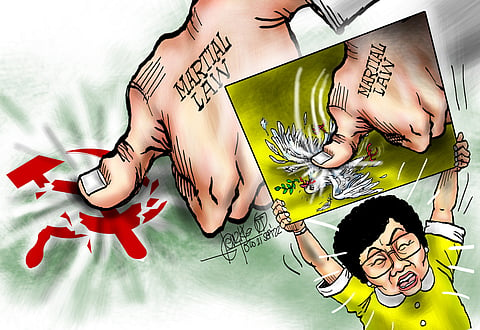
- NEWS
- the EDIT
- COMMENTARY
- BUSINESS
- LIFE
- SHOW
- ACTION
- GLOBAL GOALS
- SNAPS
- DYARYO TIRADA
- MORE

Today marks the 50th anniversary of that historic date when President Ferdinand Edralin Marcos Sr. issued Proclamation 1081, which placed the entire Philippines under martial law.
As pointed out in a previous commentary, martial law in 1972 saved the country from a Maoist communist takeover.
Expect anti-Marcos agitators, Liberal Party stragglers, communists and their sympathizers in the media to mark the day with references to President Marcos as a dictator, sweeping claims that martial law bred corruption and abuse, and that the "icon of democracy" Corazon Aquino "restored" freedom in the Philippines through the "peaceful" 1986 EDSA mutiny.
All that is hogwash.
Under the 1935 Constitution, the charter in force in 1972, martial law is an emergency measure available to the President to save the country from the communist insurgency.
Martial law as enforced by President Marcos scuttled the imminent communist takeover of the Philippines and saved the republic. Rebels were either detained or fled to the hills. That is why the local communists continue to vilify Marcos and martial law to this day.
If martial law is the evil measure the communists portray it to be, why is it expressly allowed in the 1935 and 1973 charters, and in the Aquino-sponsored 1987 Constitution?
The proclamation of martial law in 1972 was a pioneering experiment, and like any experiment, martial law had its imperfections. Many soldiers committed abuses, and some corruption in the bureaucracy took place.
What the communists conveniently fail to mention is that during martial law, abusive government officials and corrupt bureaucrats caught in the periodic dragnet of the State were dismissed from the service.
Criminals well dealt with by the strong arm of the law.
Local drug lord Lim Seng was executed by firing squad during the early months of martial law. His execution forced drug syndicates to leave the country and operate elsewhere.
The 1986 EDSA mutiny was peaceful because President Marcos refused to allow any soldier to fire at the people gathered at EDSA. Rather than hurt his own people, Marcos chose to leave Malacañang temporarily and reorganize his supporters in northern Luzon.
Unfortunately, the Americans double-crossed President Marcos and his family. Instead of taking them to Ilocos Norte as earlier promised, the Americans brought them to Hawaii.
For the record, not a single civilian was killed or deliberately hurt at the EDSA mutiny. Sadly, the adamant refusal of President Marcos to use deadly force against the civilians at EDSA is always conveniently ignored by anti-Marcos elements in their narrative of this historic event.
Far from being the "icon of democracy," she is portrayed to be in the anti-Marcos media, Corazon Aquino exemplified disdain for freedom and constitutional rights.
Aquino claimed to champion press freedom, but she filed a libel case against the late veteran journalists Maximo Soliven and Luis Beltran. That case was dismissed by the Court of Appeals.
Farmers and peasants holding a peaceful rally outside Malacañang were killed by Aquino's security forces.
Aquino's administration was so immersed in corruption that Beltran once referred to a number of Aquino's thieving relatives as Kamag-anak Inc.
There are many other misleading stories about the Marcos years peddled by contemporary anti-Marcos personalities.
Last 21 August, a columnist in another newspaper claimed that the May 1984 Batasang Pambansa election "became a fierce battleground between the Marcos regime and the boycott movement" and that the boycott movement "was the highest point in the life of the Maoist CPP-NPA-NDF."
That claim is patently false, and gives the communists credit they do not deserve. Only the communists and their minions supported that boycott movement. That boycott call was obviously ignored by the electorate, as seen in the many voters who trooped to the polling precincts. Voters gave one-third of the Batasan seats to the political opposition party UNIDO headed by Salvador "Doy" Laurel.
Indeed, the communists and their allies will not hesitate to lie just to discredit President Marcos.
